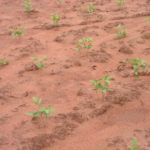


Meridian Institute
5/2019—11/2020
There is growing awareness about the importance of soil health to sustainable food systems and the current and potential roles of soils in sequestering carbon. Soil health is essential for water retention and nutrient cycling, crop productivity, erosion reduction, water quality, resilient farms, healthy foods and carbon sequestration. As a result, there is also greater focus on soil health tools, technologies, and services and a proliferation of efforts focused on these issues. While many technological and knowledge-based advances for improving soil health already exist, many of them are not linked or are redundant. In addition, numerous factors limit farmers’ ability to adapt, develop, and use these tools, practices, services, and technologies in a manner that is appropriate for their context and environment. Overcoming these barriers will require unusual partnerships and collaboration to create opportunities for learning and innovation that, ultimately, establish an enabling environment to help farmers, ranchers and other land stewards who are committed to sustainable food systems. While networks focused on soil health technologies exist and are further emerging, there are gaps that hamper progess. There is a need for a global community of practice (CoP) that enhances opportunities for learning and innovation, and contributes to shifts taking place globally towards more sustainable food systems. The systemic changes required to improve soil health as a critical factor in creating sustainable food systems and sequestering carbon will require cross-sectoral collaboration that fosters innovation and creativity. Meridian has documented existing soil health initiatives and networks in materials prepared for the workshop on “Accelerating Utilization of Low-Cost Soil Health Technologies and Decision Support Tools” held on 19-20 July 2018 at TomKat Ranch in Pescadero, California.
A Soil Health CoP aims to engage a broad range of individuals and institutions that will be required for systemic change. The CoP includes landowners, farmers, ranchers, land managers, supply chain companies, food companies, insurance companies, investors, researchers, policy-makers, extension practitioners, and other organizations that can drive practical application of soil health tools and technologies. The CoP focuses on enhancing connectivity between soil health tools and service developers and a range of direct and indirect users and beneficiaries. The CoP would also add value to existing initiatives and networks by intentionally engaging non-traditional partners and end-users in development of action plans and implementation strategies aimed at scaling up, promoting or enabling the large-scale use of tools and technologies to improve soil health. The ultimate objective of the CoP is to contribute to and enhance efforts to improve soil health.
During the workshop held in July 2018, participants working on specific soil health technologies identified actions that could accelerate and enhance their work. Participants developed action plans for the USA and for Africa. Although conditions are significantly different in the USA and Africa, participants found great value in comparing the soil health tools and technologies that could enable soil health improvements. The project uses action plans as organizing tools to convene the CoP. Stakeholders from the USA and from Africa would be convened in separate processes to: 1) review the draft action plans; 2) refine and focus them as needed; and 3) collaboratively develop strategies for how these actions could be supported and connected in a manner that helps individual initiatives and accelerates movement at the continental scale towards sustainable food systems.
